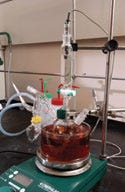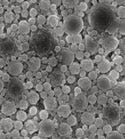Biodegradable Polymers Deliver Critical Drugs
R&D DIGEST
October 1, 2008
|
Georgia Tech professor Niren Murthy has developed a family of biodegradable polymers that could help treat serious inflammatory diseases. (Gary Meek/Georgia Tech) |
Microparticles that degrade in the body without causing additional inflammation could be used to send drugs to specific areas. Certain biodegradable polymers (polyketals) might be delivered orally—they can withstand the elements in the stomach before releasing therapy in the intestines.
Researchers are looking at how they can use the polyketals to deliver drugs to treat inflammatory illnesses such as bowel disease. Because the polymers degrade and don't build up in the tissue, they reduce inflammation that occurs in the area.
|
During the process of creating biodegradable microparticles, researchers work with a three-way reaction flask that has an addition funnel and thermocouple for temperature measurements. |
The benefit of these polyketals is that they are stable in acids and bases. They degrade around a reactive oxygen species called superoxide, which is located near and in inflamed tissue. Tests involving cell cultures revealed that the polymers break down faster in cells that overproduce superoxide.
The project collaborators are from the Georgia Institute of Technology, Emory University (both Atlanta), and the University of Rochester Medical Center (Rochester, NY). In addition to the antiinflammatory work, they are investigating the use of the polymers for acute liver failure. According to Niren Murthy, the team has adjusted the hydrolysis rates of the polyketals to deliver a lifesaving drug within 1–2 days. Murthy is an assistant professor of biomedical engineering at Georgia Tech and Emory. Other potential uses for the polymer include sending proteins to an ailing organ and treating heart attacks.
|
Imaged using a scanning electron microscope, these microparticles are loaded with a special therapeutic enzyme to treat acute liver failure. |
“Delivering proteins inside microparticles has been limited, because it required using organic solvents that frequently destroyed the proteins,” Murthy said in a Georgia Tech press release. The solution was to immobilize the protein on the polyketal surface, which was done by integrating a nitrilotriacetic acid–lipid conjugate into the polymer. Lab test results showed that half of the bound proteins were released within one day.
Work on the polymers began five years ago, and the collaborators plan to develop new polyketals. Each research institution has filed a patent on the drug-delivery system. The National Science Foundation and the National Institutes of Health funded the research.
Copyright ©2008 Medical Device & Diagnostic Industry
About the Author(s)
You May Also Like




.png?width=300&auto=webp&quality=80&disable=upscale)
